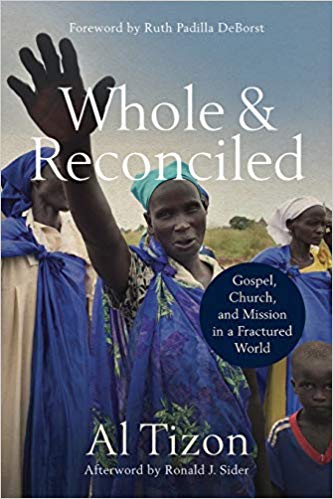by Christine Sine
I mentioned a couple of weeks ago in my post Discerning the Way Ahead that the place we need to start is by revisiting our theology. Al Tizon’s book Whole and Reconciled: Gospel, Church and Mission in a Fractured World, is one resource that I have used in the last couple of weeks to help me do that. I love Al’s emphasis on reconciliation, a message that is much needed in today’s world.
I hope you enjoy this interview with Al that I did recently about Whole and Reconciled .
What motivated you to write the book?
Reality and a question motivated this book. The reality of the increasing fragmentation of the world via racism, ethnocentrism, nationalism, tribalism, religiously-motivated violence, as well as senseless violence made me reflect much on the renewed need to see peace and reconciliation as central to the gospel. And the question that inspired the writing was, “Is the church at all in position to bear witness to the good news of peace and reconciliation in Christ in a fragmented and fragmenting world?” I know it is called to be peacemakers and reconcilers, but is it in a position to be so? If not, what must we do to realign ourselves in the Spirit to become what we have been called to be?
What did you enjoy most about the process?
“Enjoy” is not the first word that comes to mind when it comes to book-writing; though I know you well enough, Christine, that I totally appreciate the way you asked the question! For me, book-writing begins with a burden, a broken heart, an informed intuition I can’t shake. Writing is cathartic for me. Beyond that, I write with the hope that my words can lead others to live a meaningful life by participating in God’s mission with “bold humility.”
What one thing would you like readers to take away from the book?
That peacemaking in Christ is absolutely central to God’s whole mission in a divided, broken world. “Peace give I to thee. Not as the world gives, give I to thee. Peace give I to thee.” Sorry to break out in a classic Maranatha song, but that what comes to mind in answer to your question! Peacemaking cannot be relegated to the periphery. It cannot just be the task of pacifist Christians. It cannot be seen as the domain of only those on the left, vegan, Birkenstock fringe. Kingdom peacemaking must be front and center for the whole church as it lives out the Great Commission in the world.
On p31 & 32 you talk about the decentering of the church and the emergence of a truly global Christianity. Can you explain a little of what you mean
The church of the center, that is, a church that shares in the dominant power structure of society, is what is called Christendom. Part of what it means to be living in a post-Christendom world is that the church has been involuntarily pushed out of the center. As such, it has lost its privileged position and has found itself on the margins of society, bereft of the power to inform and shape as it once had. What I’m describing, however, is only the Euro- or white church; churches of color and churches that have emerged from traditionally missionary-receiving countries have never “enjoyed” the center. Black and brown churches have always been on the margins. In a post-Christendom age black, brown, and white churches are all on the margins together, giving us the opportunity to be truly the global mosaic of God’s people serving the poor, proclaiming good news to the lost, and speaking truth to power.
On page 80 you say Jesus testifies to the restoration of the shalom of God and we by the power of the Spirit must too. Can you share one example of where you see this happening?
My mind immediately goes to Pune, India where the Hindustani Covenant Church shines the light of Christ like no other church I’ve ever seen. But let me first say that I see the faithful all around the world testifying to God’s shalom. It’s the only vision that gives me hope that God is indeed real and cares about us. Spirit-led efforts at authentic evangelism, sincere compassion, sacrificial justice, and true peace don’t accomplish shalom; they testify to the shalom that’s coming in Jesus Christ. They give glimpses of the kingdom, and the more comprehensive the effort on the part of a church—that is, inclusive of evangelism, compassion, justice, and peace—the clearer the glimpse.
The Hindustani Covenant Church in Pune, India is the poster church for holistic ministry. Through water projects, economic development programs, educational programs, health programs, ministry among eunuchs, ministry to trafficked women, relief efforts, and so on, the communities in which they serve know that HCC genuinely cares about the most vulnerable. The first time I visited HCC, I came to see for myself how these social programs are benefitting the lives of people. It would be an understatement to say I was impressed. The number of lives being changed was remarkable. But then on that Sunday before church, 36 people were baptized, testifying to the evangelism at play in HCC’s ministries. 36 people experienced God’s love and said Yes to Jesus. I remarked to the pastor (and president of HCC) whom I was standing next to how amazing that 36 people were being baptized. He apologized and said there are usually more!
P98 – Our personal transformation journey is an essential part of a theology of the whole church. What kinds of personal transformation do you think we need to go through to become effective members of a global church?
Dethroning the self and bowing the knee to Jesus Christ as Lord is the most fundamental transformation on a personal level. In terms of journey, we are personally being transformed as we move away from living for ourselves to living for Jesus and serving others in the name of Jesus. Living for others is a sign of true conversion. Additionally, to poise ourselves to be “card-carrying members of the whole, global, reconciled church” is when we move from only loving our-kind—albeit racially, ethnically, tribally, or nationally—to loving human-kind, in all its diverse glory. Loving the different, the other, even the enemy, is another sign of true conversion to Jesus Christ, Lord of all.
P 183 – The church can no longer view peacemaking as optional. What kinds of peace making do you think are most important. What are the most important steps each of us can take to become God’s peacemakers in our increasingly fractured and violent world?
Peacemaking is indeed a non-negotiable of the gospel; it always has been. Our fragmented and fragmenting world simply helps us to see the truth of that. The first step in practicing or making peace in the world is to root out the prejudice, hatred, and violence in our own hearts. As I developed in the book, before reconciliation is a theology, a missiology, or a strategy, it is first and foremost a spirituality. People whose hearts are becoming whole and reconciled in Christ can alone be agents of Christ’s peace and reconciliation in the world. So, practically, let us be a people cultivating hearts of peace as an absolutely necessary step to becoming global peacemakers. Secondly, let us be a people who demonstrate that the peace of Christ works, that it can break down walls between women and men; rich and poor; this tribe and that tribe; and black, brown and white peoples. Let us strive in the Spirit to be the all-tribes-and-nations church today as a signpost of what Revelation 7 depicts in God’s future. Efforts toward a multi-ethnic, multi-tribal, multi-national church demonstrate to the world that peace and reconciliation are possible. Beyond these, I outline six principles in ch. 11—a heart of peace; the power of relationship; vulnerable dialogue; healing through repentance, forgiveness, and lament; the work of justice; and a commitment to nonviolence—that I believe need to be operational for peace to have a chance in any given conflict. This is peacemaking as mission.
I hope this interview has whetted your appetite and that you will pick up a copy of Whole and Reconciled for your own reading and discernment process.

Al Tizon
Rev. Dr. Al Tizon has served as the executive minister of Serve Globally since 2015. This role includes administration, pastoral support, and strategic direction for 125 missionaries in 25 countries. He also oversees Serve Globally ministries—Covenant World Relief, Paul Carlson Partnership, Covenant Kids Congo, Global Engagements, and the Center for World Christian Studies—and works as Affiliate Associate Professor of Missional and Global Leadership at North Park Theological Seminary. Al has engaged in community development, church leadership, advocacy, and urban ministry in the United States and the Philippines. He is the author of four books, co-author of one, and co-editor of two. Al is passionate about missiology, his four grandchildren, his Great Dane “Dude,” sushi, and racquetball.
NOTE: I receive a small amount for purchases you make through the links above. This helps to keep Godspace running.

